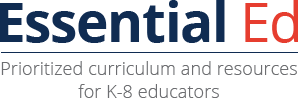Informative and Expository Texts and Research
Unit description: Students will craft a self-generated research project that includes information from multiple reliable sources. Throughout their project, students apply their knowledge of identifying and evaluating an author’s argument in informational texts, as well as their ability to determine relevant, sufficient evidence. Students will take part in ample group discussion throughout the entire research process, and will present their findings to their peers.
These learning progressions were developed using Next Generation Learning Standards and were crosswalked with the Common Core Standards.
Essential Outcomes
Reading
- 8R1: Cite textual evidence to strongly support an analysis of what the text says explicitly/implicitly and make logical inferences.
- 8R2: Determine one or more themes or central ideas of a text and analyze their development over the course of the text; summarize a text.
- 8R3: In literary texts, analyze how particular lines of dialogue or events propel the action, reveal aspects of a character, or provoke a decision. In informational texts, analyze how individuals, events, and ideas are introduced, relate to each other, and are developed.
- 8R5: In literary texts, and informational texts, compare and contrast the structures of two or more texts in order to analyze how the differing structure of each text contributes to overall meaning, style, theme or central idea.
- 8R8: Trace and evaluate an argument and specific claims in a text, assessing whether the reasoning is valid and the evidence is relevant and sufficient and recognizing when irrelevant evidence is introduced.
Language
- n/a
Writing
- 8W2: Write informative/explanatory texts to examine a topic and convey ideas, concepts, and information through the selection, organization, and analysis of relevant content.
- 8W5: Draw evidence from literary or informational texts to support analysis, reflection, and research. Apply the grade 8 Reading Standards to both literary and informational text, where applicable.
- 8W6: Conduct research to answer questions, including self-generated questions, drawing on multiple sources and refocusing the inquiry when appropriate. Generate additional related questions that allow for multiple avenues of exploration.
- 8W7: Gather relevant information from multiple sources; assess the credibility and accuracy of each source; quote or paraphrase the data and conclusions of others; avoid plagiarism and follow a standard format for citation.
Speaking and Listening
- 8SL2: Analyze the purpose of information presented in diverse formats (e.g., including visual, quantitative, and oral) and evaluate the motives (e.g., social, commercial, political) behind its presentation.
- 8SL3: Delineate a speaker’s argument and specific claims, evaluating for sound reasoning, and the relevance and sufficiency of the evidence; identify when irrelevant evidence is introduced.
All Standards Addressed in this Unit
- R1, R2, R3, R5, R7, R8, R9
- L3, L4, L5, L6
- W2, W5, W6, W7
- SL1, SL2, SL3, SL4, SL5, SL6
Essential Questions and Big Ideas
Why is nonfiction important?
-
- Nonfiction is an important genre because it provides necessary information to its readers.
- Informative and expository texts are two types of nonfiction that can provide us with necessary information on a topic.
- Authors make arguments in nonfiction texts to convey their information to the reader. Good readers can identify and track authors’ arguments.
- It’s important to evaluate the legitimacy of nonfiction so that we as readers can make informed decisions based on factual data.
How do we ensure reliable research, and make research relevant?
-
- Some authors have hidden agendas and utilize untruths written as facts to persuade readers. It’s our duty to determine relaitble v. unreliable sources to create a factual project.
- We must be informed researchers so we are pulling data and facts from appropriate sources.
- Choosing topics that are important to ourselves and our communities can have a positive impact and spark change.
- Good researchers have a plan or guide.
How do researchers develop and refine critical research questions and use outside sources to build and present an informed understanding?
-
- Good researchers consider multiple sources and outcomes of research questions to refine and build on a topic.
- Good researchers present their findings in informed and effective ways that convey facts while captivating an audience.

